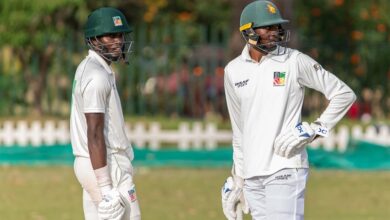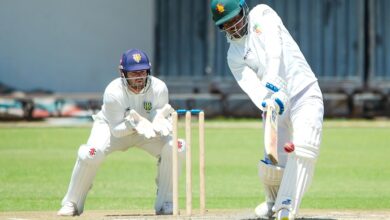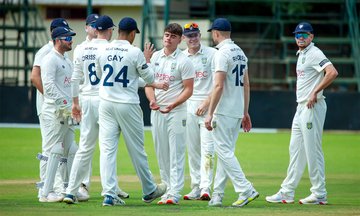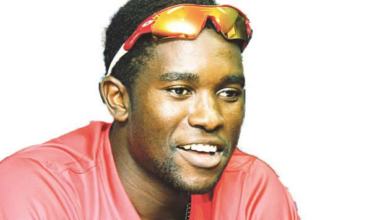Choga, Masters pay tribute to late Knox
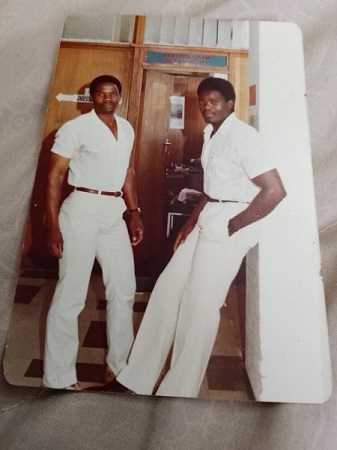
SIX-time Zimbabwe National Bodybuilding Champion Innocent Choga and former bodybuilder George Masters have paid tribute to the late bodybuilding Godfather Rufaro “Knox” Mapfungautsi.
Knox succumbed to high blood pressure and was buried last Wednesday at his rural home of Kazangarare Village in Karoi.
Both Choga and Masters concur that bodybuilding is poorer and has lost one of the most experienced and knowledgeable trainers.
The late Knox worked under renowned former bodybuilder and administrator Kays Rushika as a trainee gym instructor, which prepared him for the 40 years of service to the fitness and wellness industry he would later provide.
Masters, who later became a business associate of Knox, traced the life of the late gym owner from humble beginnings to becoming a top businessman in the fitness industry.
“What made Knox outstanding is that he came from Hurugwe, Karoi to Harare as a boy and worked as a gardener and later became a fitness trainer at Hercules now Empire gym,” Masters told EnterSportNews.
“Knox wasn’t finished yet. He became a fitness trainer at Body Fitness Centre, and to cap his remarkable journey, and he bought Body Fitness Centre.”
Seven years after Zimbabwe attained independence, 22-year-old Choga won his maiden Mr Zimbabwe bodybuilding title, and the older statesman, Knox, came third.

Instead of creating some rivalry, Knox, in his wisdom, did not see Choga as a foe but saw him as the new poster boy of the sport whose time had come therefore needed to be encouraged as this was beneficial to the sport.
“I was much younger than the athletes I competed with then. I am sure they were not expecting that. There was no pressure then. We competed for no cash but the right to represent the country at the world championships, so there was no intense rivalry. It was healthy rivalry,” opined Choga.
“Then we would even train together with our rivals, learn from each other and share knowledge. We understood when one was in peak condition, it was their time.
“I had no qualms with anyone. Actually, I got a lot of encouragement from all quarters, including people that I competed against, such as Knox.”
The nation has been plunged into mourning some of its sporting heroes like David Mandigora, Misheck Chidzambwa, Steve Kwashi and now Knox in the last couple of months.
The passing on of these greats has once again opened a debate about how the country looks after its heroes once they retire from active participation in sport.
Unfortunately, it is only the mainstream sporting codes that arouse such debates. Masters has called for the recognition of bodybuilders too.
“We are heroes like any other sporting heroes in the country. Therefore, people like Knox should be honoured for their role in developing our sport,” added Masters.
People mistake the sport of bodybuilding with undisciplined, rowdy bouncers. When you listen to Choga speak, you discover that he is not all brawn, but he has the brains of a critical thinker. He also amplified Masters’s voice on the issue of honouring bodybuilders, especially when they are still alive.
“I would like to agree with what soccer legends said that sporting heroes should be honoured whilst they are still alive. I think it is necessary to check up on each other regularly to know what’s going on in our lives,” Choga said.
“It doesn’t make sense that we are generous with eulogies when one dies but mean with advice when one is alive. It is not only about financial issues but physical and mental health. Physical and psychological conditions are known to afflict retired athletes.”

Knox did his part by honouring those that excelled in bodybuilding, and one of those beneficiaries is Choga.
“After I retired from competitive bodybuilding, Mukoma Knox gave me free membership for life at his gym, Body Fitness, in recognition of my sporting achievements,” quipped Choga.
Zimbabwe’s fitness and wellness industry has been snowballing, and you can’t talk about this industry without mentioning the names of two trailblazers, the late Body Fitness Centre owner Knox and Rushika.
“As far as I know, Mukoma Knox and Rushika were the first two black gym instructors in commercial gyms in the post-independence era, I am sure.
“Mukoma Knox was a passionate aerobics instructor. Although he was the owner of the gym, he was still taking classes. He trained with many athletes including soccer players, track and field athletes as well as captains of industry, and people from all walks of life.”
On the lessons they learnt from Knox, Masters, a successful businessman in his own right, chose the entrepreneurial aspect of Knox’s life.
“I Learnt that any child could become a top bodybuilder and an owner of a gym one day if they put their mind to it,” Masters said.
Choga chose to focus on the simple virtues that Knox lived by “from Knox, I learnt about humility, commitment and perseverance. The younger generation needs to be aware that the sport does not begin and end with them.
“They need to learn about their predecessors, what they did right and what they did wrong. They will then be able to chart their way forward by making informed decisions.”
“When you are ignorant of the history of the sport, you may repeat mistakes of the predecessors, and you may miss out on some things that could help you.
“I also would like to advise them to depend on hard work like Knox used to do. There is no substitute for research and hard work. Using unnatural means for short-cuts will only bring misery and taint the sport, as much as it is abhorrent.”
On a parting note, the most decorated Mr Zimbabwe had some words of wisdom for sports administrators, especially those that may not have Institutional memory of past events and athletes who have shaped their sporting code to what it is today.
“When miners exhaust mines, they are encouraged to rehabilitate the land they were working on so that it can be used for other purposes. I think clubs and sports associations need to do the same and assist retired athletes properly and not to just buy them groceries but to ensure that they are well and productive to fend for themselves,” said Choga.
“Even if the association has new members, it’s their duty to ensure that the retired athletes represent their sporting disciplines well. It is difficult to encourage people to join your sporting disciplines when the retired athletes poorly represent you in terms of finance, physical and mental well-being.”


